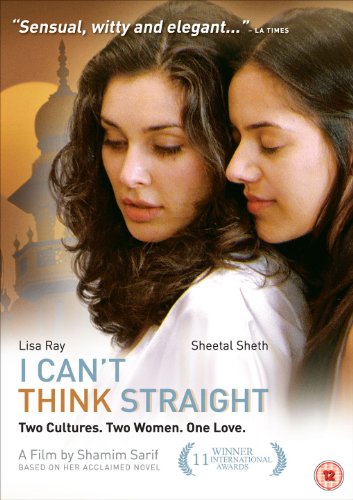
I CAN’T THINK STRAIGHT
UK, 2007, 88 minutes, Colour.
Lisa Ray, Sheetal Sheth, Antonia Frering, Nina Wadia, Amber Rose Revah, Sam Vincenti, Kimberley Jaraj, Rez Kempton.
Directed by Shamim Sarif.
The play on words in the title (which some will not pick up at once) indicates themes of sexual identity. More and more films have tackled these issues, especially as young people struggle with finding their identity, experience confusion, experience hostility and find themselves in psychological and moral binds. Cinema has different ways of dramatising the theme, documentary, serious drama, or lighter dramas that offer characters to be identified with as well as the dramatising of fear, suspicion and rejection.
Writer-director, Shamim Sarif, has opted for the romantic drama. One of the dangers of this choice is that the plot and its entanglements may seem more than a little like soap opera with its melodramatic flourishes and its sometimes arch and 'staged' dialogue. Something of this happens with I Can't Think Straight. (In her second film, The World Unseen, with the same actresses, she is more successful by using the telenovella format rather than the soap serial.)
The director has a task on her hands because she is presenting a same-sex love story where one partner is a Palestinian living in Jordan with some Christian background and where the other is a Muslim Indian living in London. Issues of religion and culture are important, especially for women, many of whom experience oppression at the best of times.
By opting for the romantic drama, Sharim Sarif has also chosen affluent worlds and materially comfortable lives which puts the action at one remove from most audiences: lavish parties in Jordanian mansions, visits to Oxford, polo tournaments, book signings, and no end to fashionable clothes. This is the world of Santa Barbara or other serials which have an enormous following but are not likely to be labelled as reality.
This means that we get a glossy tale and treatment where the protagonists experience great difficulties – especially from caricature mothers, the narrow Indian who thinks only of making successful marriage matches and a Cruella de Ville of a Jordanian, anti-Israel, imperious wife and mother. Actually, it is the men who are instantly kind and understanding, both fathers and sympathetic former boyfriends.
1.The target audience for this film? Same-sex themes? For partners? For parents and relatives?
2.The settings in London, affluent, flats, homes? Oxford? Polo clubs? Restaurants? The comparisons with the mansions in Jordan? The musical score and songs? The frequent use of songs – and the lyrics illustrating characters and themes?
3.The title and the play on words?
4.The situation of same-sex relationships in England, in Indian Muslim families, in Palestinian families, in Jordan? The film’s appeal to change of attitudes?
5.The director’s decision to do romantic serious comedy? The nature of the dialogue? The characters, affluence – with more than a touch of the soap opera television serials?
6.Jordan, Tala, her many engagements, the lavish parties, her breaking off her engagements? Her dominant mother and her criticisms, haughtiness? Her dealing with the housekeeper – and the housekeeper spitting in her drinks and continually failing to get the drinks taken, her final achievement and laughter? The father, his being more considerate? Tala and her sisters, the dresses, their being modern young women compared with the traditions of Palestine and Jordan? The Palestinian background, the anti-Semitic statements?
7.The film’s stance on Palestinians, on the Muslim traditions? On Christian Palestinians? The references to the Israelis, the treatment of Palestinians? Political implications?
8.The contrast with India, Leyla and her writing, working for her father, her father’s kindliness, her sister’s ability to sell insurance, the father’s discussions about insurance? At home? Her encounter with Tala? The infatuation? Her boyfriend, his kindness, her not clicking? Her room, k.d. lang…? Her sister’s realisation? Her not being able to come out? The relationship with Tala, the visit to Oxford? The discussions with Tala about the relationship? Tala leaving? Leyla and her coming out to her parents? Her caricature mother and her cooking, fussing, wanting to arrange a marriage? The father’s consideration? Her sister’s support?
9.Tala, in England, the polo match, the attraction to Leyla, their being together? The beginning of the relationship? Tala and her engagement, having to return, the strong traditions and her silence? Her return to Jordan, the preparation for the marriage, her finally breaking it off? Her discussions with her sisters? The consideration of the groom? Her father? Her mother being frantic? Her return to England, the lecture on Jordan, the encounter with Leyla and the girlfriend? The later meetings, Leyla and her success with her book, the book-signings? Her signing Tala’s book?
10.The mothers and their behaviour with their daughters’ coming out? The touch of the caricature?
11.The fathers, instantly sympathetic? The boyfriends, Ali and his discussions with Yasmin, their consideration?
12.The gay relatives, the uncle, the cousin from New York – with caricature behaviour?
13.How interesting a drama, romantic comedy, the melodramatic flourishes, the soap opera dialogue? A story that was able to influence audiences and their thinking about same-sex relationships?